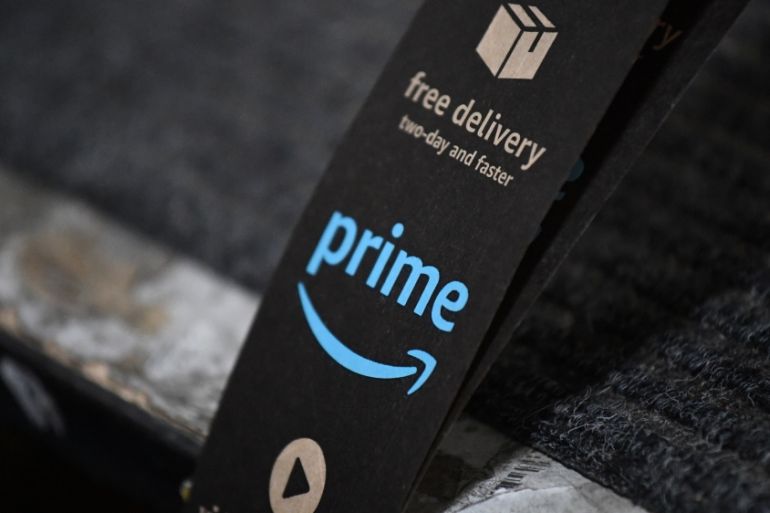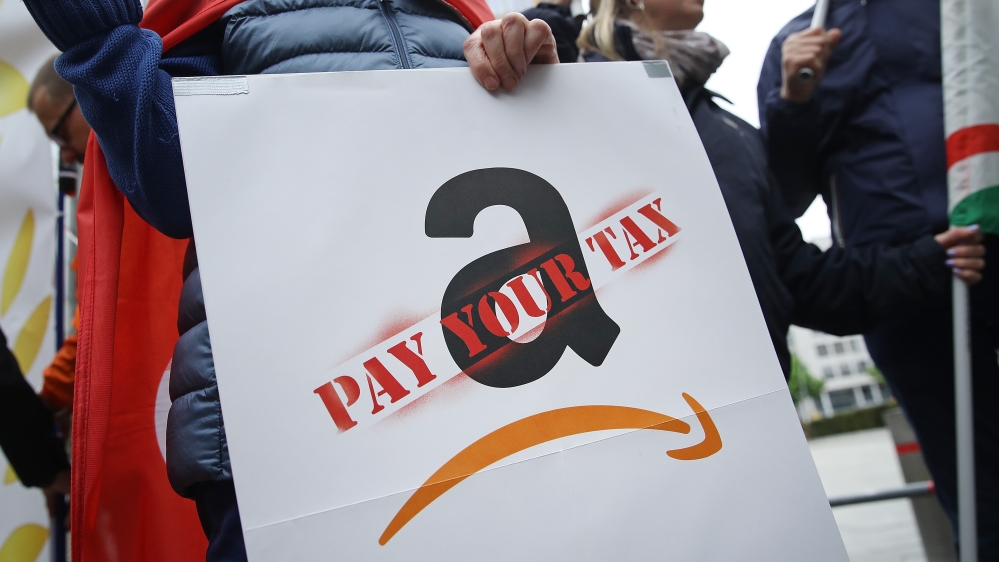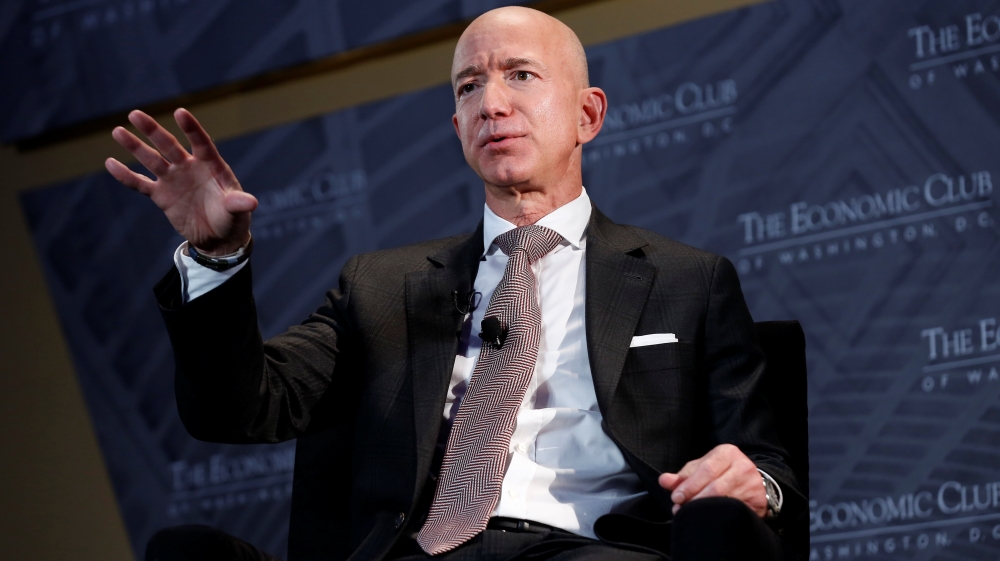Is Amazon a true monopoly or does the Bezos behemoth not qualify?
As workers strike and the company kicks off Amazon Prime Day sales, many question whether the firm is too dominant.

Loyal customers love it, business rivals fear it, and public officials increasingly target it.
As a global retailer, cloud services provider, and media production house, Amazon is the largest internet company in the world and the second-biggest employer in the United States.
Keep reading
list of 4 items‘We need you’: Solomon Islands’ support for US agency’s return revealed
Why are nations racing to buy weapons?
Parallel economy: How Russia is defying the West’s boycott
With Amazon workers’ strikes in the US and Germany coinciding with its two-day Amazon Prime event – which began Monday – the company faces doubts about its policies and whether it has monopolistic power.
How is ‘monopoly’ defined?
According to the Merriam-Webster dictionary, a monopoly is “complete control of the entire supply of goods or of a service in a certain area or market”. The implication is that monopolistic companies are able to destroy competitors and dictate prices.
‘Monopoly’ sounds bad, but is it really?
Economists say too much economic power held by one corporation stifles innovation, drags down wages, gives consumers fewer choices, and makes an economy less competitive. This is why antitrust laws exist.
What is antitrust law?
US antitrust law generally focuses on whether a company harms customers. The core principle is to ensure competition and protect consumers against predatory practices – thus preventing monopolies and strengthening the open-market economy.
Would Amazon qualify as a monopoly?
Despite its explosive growth, Amazon falls short of meeting the US Department of Justice‘s monopoly threshold, defined as a market share of greater than 50 percent. By next year, Amazon says it will have around four percent of all retail sales in the US, and just one percent of the $25bn global market. So its share of the e-commerce market in the US is 37.7 percent, according to eMarketer. But online represents only 10 percent of the entire US retail market – with 90 percent still brick-and-mortar stores.
Is Amazon dominant in specific sectors?
Amazon, based in Seattle in Washington state, is a tremendously large conglomerate, with a valuation that hovers around $1 trillion. The firm’s dominance can and does prevent other companies from competing in certain industries.
Barry Lynn, director of the Open Markets Institute – which studies corporate concentration in the US – told Al Jazeera that he believes Amazon holds a monopoly over the US book market, as well as the market for some types of toys and electronics. He added that this posses a political threat because “a lot of publishers and authors are terrified of speaking out about Amazon’s monopoly”.
Does the company have a monopsony?
“Monopsony” refers to the reverse of a monopoly – a situation where there is only one buyer that controls the market because it is the main purchaser of goods and services from sellers. For Amazon, this could apply to its leverage over prices charged by shipping firms such as FedEx and UPS. It could also include regions where Amazon is the main employer and manages to push down employee wages.

What can the US government do to Amazon?
Amazon has not been labeled as a monopoly by the Federal Trade Commission (FTC), though the agency is currently probing the company. The Retail Industry Leaders Association – which represents Amazon competitors, including Walmart, Target and others – urged the FTC in a letter last week to examine “persistent oligopolies”.
Congress could pass new laws that set a new, stricter monopoly threshold. Amazon’s acquisition of Whole Foods in 2017 already raised eyebrows among US lawmakers.
Are there other political threats to Amazon?
State-level attorneys general are free to pursue their own cases. Senator Elizabeth Warren, a Democrat from Massachusetts who is running for US president, has attacked Amazon’s dominance in the e-commerce marketplace as part of her 2020 platform and called for the company to be dismantled.
The European Union, meanwhile, cites similar concerns as Warren and is investigating the juggernaut’s dual role as a seller of its own products and a platform for its competitors.
Does Trump think Amazon is a monopoly?
US President Donald Trump has tweeted that Amazon has a “huge antitrust” problem. If re-elected in 2020, Trump could, through executive action, put pressure on the legislative and judicial branches to crack down on Amazon. A growing chorus of critics is demanding that Amazon be broken up because its market share is so high. And if a political consensus emerges that Amazon – and other big tech firms like Facebook and Alphabet’s Google – interfere with free-market competition, the government could target Amazon.
If divided, what would Amazon become?
It is possible that the company could be forced to operate as separate firms dealing with web services, retail, logistics, entertainment and life sciences. In such a scenario, each unit would not retain the advantages that Amazon currently enjoys, as a corporation straddling a wide variety of economic sectors.
This could also adversely affect the wealth of CEO Jeff Bezos, who has been labeled by Forbes magazine as “far richer than anyone else on the planet” and by Bloomberg as “the richest man in modern history”.

How does the new Amazon HQ2 in DC play into this?
Some experts suggest that the second Amazon headquarters being established in Crystal City, Virginia – just across the river from Washington, DC – will help ingratiate the company with lawmakers. Amazon’s proximity to Capitol Hill could shift perceptions, as well as drum up business with US government agencies. Last year, Bezos told the Washington Economic Club, “It’s really important that politicians and others understand the value that big companies bring, and not demonise or vilify business in general”.
What is the relevance of Prime Day?
The e-commerce behemoth has created an annual shopping holiday that attracts millions of buyers to its site in search of midsummer bargains. This year, the commercial bonanza is observed on July 15th and 16th. Customers flock to Amazon, which was founded in 1994, for low prices and convenience. Known for prioritising growth over profits, the company is able to provide such good deals by subsidising its retail business with the impressive cash flow that comes from cloud computing.
How does the company treat third-party sellers?
Amazon says that it succeeds when its selling partners succeed, creating huge opportunities for entrepreneurship and new jobs. A statement from the company provided to Al Jazeera said that “Amazon spends billions of dollars each year to help sellers succeed in our store, driving traffic, operating the servers and infrastructure that keep our online store open at all times, and combatting fraud and abuse”.
The statement continued: “Amazon’s biggest single capital expenditure is its fulfillment and distribution network, which directly benefits sellers … Our investments allow sellers to focus on their products while reaching customers throughout the world, leveling the playing field and lowering entry barriers”.
Will vertical integration bring higher prices?
Beyond offering a wide range of products made by other companies, Amazon also manufactures and sells its own goods. It has visibility over marketplace analytics and knows which third-party sellers are successful. This can boost Amazon’s own forays into new areas. While prices may stay low for now, over the long term the company could charge at will for goods that increasingly cannot be bought elsewhere.
Why might regulators step in?
In a 2017 law journal article widely cited by Amazon’s critics, antitrust expert Lina Khan argued that the company poses more of a threat as it accumulates more market share. She said that “the current framework in antitrust – specifically its pegging competition to ‘consumer welfare’, defined as short-term price effects – is unequipped to capture the architecture of market power in the modern economy”.
Should Amazon be worried?
The standard in predatory pricing cases remains high, because a company must be proven to have wronged plaintiffs. And Amazon has contributed mostly to deflationary forces. The law would need to be changed for antitrust rules to apply when consumers have not been explicitly gouged. While many Amazon reformers say antitrust enforcement should become more aggressive, some activists prefer to focus instead on fighting economic inequality, labour abuses, climate pollution and political influence.